26 have author last names that start with V have author last names that start with V
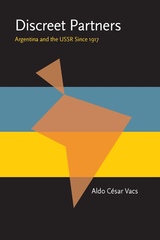
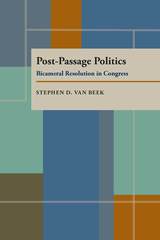
“Megabills” that package scores of legislative proposals into House and Senate bills are a phenomenon of the congressional reforms of the 1970s and the agenda changes of the 1980s. These bills generate unprecedented disagreements between the House and Senate, requiring congressional leaders, the president, committee chairs, and junior members to play new roles in this struggle for resolution.
Conference committees of hundreds of members, informal negotiations among party leaders, and preconference strategizing and behavior are among the new realities of bicameralism that are viewed in this study. These conferences are vital because they generally are the last arenas in which large-scale changes can be made in legislation.
Van Beek uses a case study approach that investigates the legislative histories of recent bills on the savings and loan bailout, the major trade bill of the late 1980s, and several budget reconciliation bills. His research is brought to life through personal experience as a legislative aide, direct observation of Congress at work, and interviews with members, staff and lobbyists.
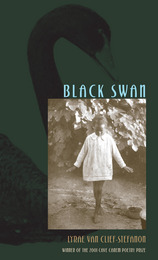
Selected by Marilyn Nelson
Finalist, 2003 Paterson Poetry Prize
"Imagine Leda black—" begins Lyrae Van Clief-Stefanon’s exciting new collection of poems. Mixing vernacular language with classical mythology, modern struggles with Biblical trials, she gives voice to silenced women past and present.
In Van Clief-Stefanon’s powerful voice, last night’s angry words "puffed / into the dark room like steam / punching through the thick surface / of cooking grits." She remembers a child’s innocence "lost / in the house where I learned the red rug / against my chest, my knees / my tongue, . . . ." Black Swan is filled with pain, loss, hope, and the promise of salvation.
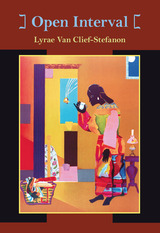

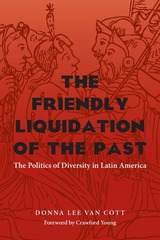
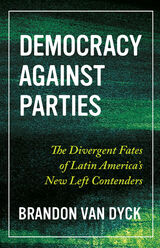
Around the world, established parties are weakening, and new parties are failing to take root. In many cases, outsiders have risen and filled the void, posing a threat to democracy. Why do most new parties fail? Under what conditions do they survive and become long-term electoral fixtures? Brandon Van Dyck investigates these questions in the context of the contemporary Latin American left. He argues that stable parties are not an outgrowth of democracy. On the contrary, contemporary democracy impedes successful party building. To construct a durable party, elites must invest time and labor, and they must share power with activists. Because today’s elites have access to party substitutes like mass media, they can win votes without making such sacrifices in time, labor, and autonomy. Only under conditions of soft authoritarianism do office-seeking elites have a strong electoral incentive to invest in party building. Van Dyck illustrates this argument through a comparative analysis of four new left parties in Latin America: two that collapsed and two that survived.

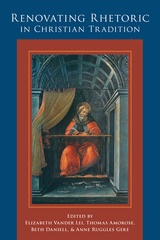
The initial chapters explore historic challenges to Christian doctrines and gender roles. Contributors examine Mormon women’s campaigns for the recognition of their sect, women’s suffrage, and the statehood of Utah; the Seventh-day Adventist challenge to the mainstream designation of Sunday as the Sabbath; a female minister who confronted the gendered tenets of early Methodism and created her own sacred spaces; women who, across three centuries, fashioned an apostolic voice of humble authority rooted in spiritual conversion; and members of the Woman’s Foreign Missionary Society of the Methodist Episcopal Church, who redefined notions of women’s intellectual capacity and appropriate fields for work from the Civil War through World War II.
Considering contemporary learning environments, other contributors explore resources that can help faculty and students of composition and rhetoric consider more fully the relations of religion and academic work. These contributors call upon the work of theologians, philosophers, and biblical scholars to propose strategies for building trust through communication.
The final chapters examine the writings of Apostle Paul and his use of Jewish forms of argumentation and provide an overarching discussion of how the Christian tradition has resisted rhetorical renovation, and in the process, missed opportunities to renovate spiritual belief.
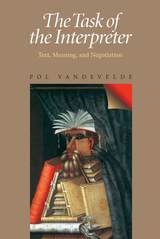
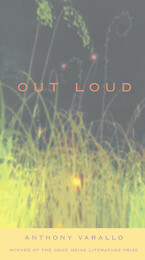
WINNER OF THE 2008 DRUE HEINZ LITERATURE PRIZE
Selected by Scott Turow
Feeling distanced from her friends and family, middle-aged divorcée Caitlin Drury is encouraged by her daughter to express her feelings in a diary, but she is hesitant: “I feel lonely she wrote, then crossed it out. She didn't like the idea of someone coming along later to read her journal, finding out she felt lonely." “Like That,” and other stories from Anthony Varallo's new collection Out Loud give voice to the disconnections of family and relationships, and the silent emotions that often speak louder than words.
In “The Walkers,” we follow a couple on their daily trek through a bedroom community, where they partially glimpse their neighbors' lives, longing for inclusion. Yet their insular lifestyle ensures that they deal with people only on the surface--without learning the truth of their problems.
Out Loud tells of longings for meaningful expression and the complexities and escapism of human interactions that keep us from these truths. Varallo uses the trials of youth and remembrances of the past, the rituals and routines of the everyday, the interactions of family, friends, teachers, and neighbors to peel away the layers of language and actions we use to shield ourselves.
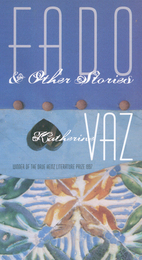
This collection is filled with narrative and character grounded in the meaning and value the earth gives to human existence. In one story, a woman sleeps with the village priest, trying to gain back the land the church took from her family; in another, relatives in the Azores fight over a plot of land owned by their expatriate American cousin. Even apparently small images are cast in terms of the earth: Milton, one narrator explains, has made apples the object of a misunderstanding by naming them as Eden’s fruit: “In the Bible, no fruit is named in the Garden of Eden - and to this day apples are misunderstood. They were trying to tempt people not into sin but into listening to the earth more closely. . . . their white meal runs wet with the knowledge of the language of the land, but people do not listen.”
Vaz’s beautiful, intensely conscious language often delicately slips her stories into the realm of the fado, the Portuguese song about fate and longing. “Listen for the nightingale that presses its breast against the thorns of the rose,” on character sings, “that the song might be more beautiful.” Such a verse might describe Vaz’s own motive behind her willingness to confront her subject’s ambiguities and her characters’ conflicts - the simultaneous joy and sorrow of some of life’s discoveries, the pain sometimes hidden within passion and pleasure.

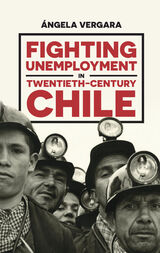
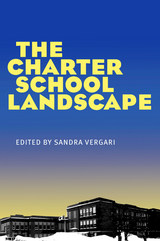
The first charter school opened in Minnesota in 1992. Within nine years, there were more than 2,000 charter schools operating in thirty-four states, Washington, D.C., and Alberta, Canada. Public discourse on the charter school reform is often passionate and politically motivated. Sandra Vergari has assembled a group of experts to present a more reflective and scholarly discussion of the reform, its performance to date, and its implications for public policy.
Each chapter focuses on a single state or province, and systematically addresses such issues as charter school laws, the politics of policy implementation, charter school accountability, controversies and trends, and prospects for the future. In addition, the contributors emphasize significant issues specific to each state that offer lessons for analysts and policymakers everywhere. As a whole, The Charter School Landscape suggests that charter schools are having a significant impact on the institution of public education and how we think about the concept of the "real public school.”
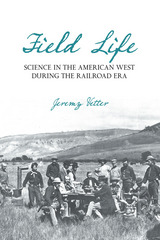
Field Life examines the practice of science in the field in the Great Plains and Rocky Mountains of the American West between the 1860s and the 1910s, when the railroad was the dominant form of long-distance transportation. Grounded in approaches from environmental history and the history of technology, it emphasizes the material basis of scientific fieldwork, joining together the human labor that produced knowledge with the natural world in which those practices were embedded.
Four distinct modes of field practice, which were shared by different field science disciplines, proliferated during this period—surveys, lay networks, quarries, and stations—and this book explores the dynamics that underpinned each of them. Using two diverse case studies to animate each mode of practice, as well as the making of the field as a place for science, Field Life combines textured analysis of specific examples of field science on the ground with wider discussion of the commonalities in the practices of a diverse array of field sciences, including the earth and physical sciences, the life and agricultural sciences, and the human sciences.
By situating science in its regional environmental context, Field Life analyzes the intersection between the cosmopolitan knowledge of science and the experiential knowledge of people living in the field. Examples of field science in the Plains and Rockies range widely: geological surveys and weather observing networks, quarries to uncover dinosaur fossils and archaeological remains, and branch agricultural experiment stations and mountain biological field stations.
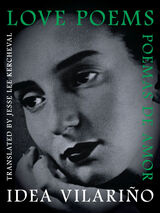
Eight years before Sylvia Plath published Ariel, the Uruguayan poet Idea Vilariño released Poemas del Amor, a collection of confessional, passionate poetry dedicated to the novelist Juan Carlos Onetti. Both of her own merit and as part of the Uruguayan writers group the Generation of ’45—which included Onetti, Mario Benedetti, Amanda Berenguer, and Ida Vitale—Vilariño is an essential South American poet, and part of a long tradition of Uruguayan women poets.
Vilariño and Onetti’s love affair is one of the most famous in South American literature. Poemas del Amor is an intense book, full of poems about sexuality and what it means to be a woman, and stands as a testament to both the necessity and the impossibility of love. This translation brings these highly personal poems to English speaking audiences for the first time side-by-side with the original Spanish language versions.
THE WITNESS
I don’t ask you for anything
don’t accept anything from you.
It’s enough that you are
in the world
that you know I am
in the world
that you might be
To me, you might be
witness judge and god.
If not
what is it for.
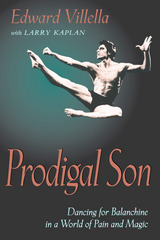
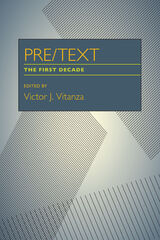
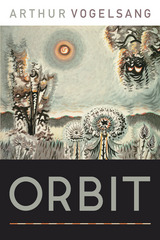
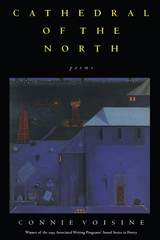
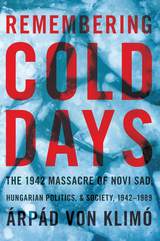
In marked contrast to other massacres, the Horthy regime investigated the incident and tried and convicted the commanding officers in 1943-44. Other trials would follow. During the 1960s, a novel and film telling the story of the massacre sparked the first public open debate about the Hungarian Holocaust.
This book examines public contentions over the Novi Sad massacre from its inception in 1942 until the final trial in 2011. It demonstrates how attitudes changed over time toward this war crime and the Holocaust through different political regimes and in Hungarian society. The book also views how the larger European context influenced Hungarian debates, and how Yugoslavia dealt with memories of the massacre.
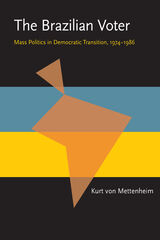
This book argues that whereas military government stifled democratic activity, public opinion quickly revived when the military liberalized electoral politics in 1974. Voters rapidly aligned themselves with parties for and against military government, acquired new views on major issues, judged leaders by their performance and policies, and grounded their beliefs in concepts of social justice. Kurt von Mettenheim examines how Brazilian voters make choices and cast their ballots runs counter to long-held liberal theories about how democracy works.
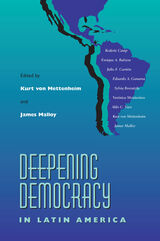
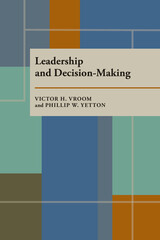
It has become a truism that “leadership depends upon the situation,” but few behavioral scientists have attempted to go beyond that statement to examine the specific ways in which leaders should and do vary their behavior with situational demands. Vroom and Yetton select a critical aspect of leadership style-the extent to which the leader encourages the participation of his subordinates in decision-making. They describe a normative model which shows the specific leadership style called for in different classes of situations. The model is expressed in terms of a “decision tree” and requires the leader to analyze the dimensions of the particular problem or decision with which he is confronted in order to determine how much and in what way to share his decision-making power with his subordinates.
Other chapters discuss how leaders behave in different situations. They look at differences in leadership styles, and what situations induce people to display autocratic or participative behavior.
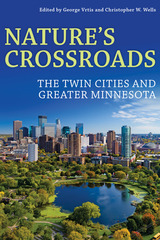
Minnesota’s Twin Cities have long been powerful engines of change. From their origins in the early nineteenth century, the Twin Cities helped drive the dispossession of the region’s Native American peoples, turned their riverfronts into bustling industrial and commercial centers, spread streets and homes outward to the horizon, and reached well beyond their urban confines, setting in motion the environmental transformation of distant hinterlands. As these processes unfolded, residents inscribed their culture into the landscape, complete with all its tensions, disagreements, contradictions, prejudices, and social inequalities. These stories lie at the heart of Nature’s Crossroads. The book features an interdisciplinary team of distinguished scholars who aim to open new conversations about the environmental history of the Twin Cities and Greater Minnesota.
READERS
Browse our collection.
PUBLISHERS
See BiblioVault's publisher services.
STUDENT SERVICES
Files for college accessibility offices.
UChicago Accessibility Resources
home | accessibility | search | about | contact us
BiblioVault ® 2001 - 2024
The University of Chicago Press









